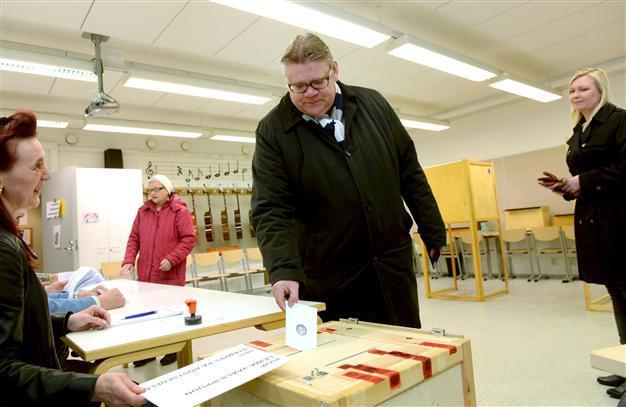Finland goes to the polls, change of government expected
HELSINKI - Agence France-Presse

Chairman Timo Soini of the Finns Party and his wife Tiina (R) cast their votes during the parliamentary election in Espoo, Finland April 19, 2015. REUTERS Photo
Finns began voting on April 19 in legislative elections expected to oust the left-right government after a campaign that has focused heavily on how to lift Finland out of a three-year economic slump.Public opinion polls have predicted a resounding victory for the liberal-agrarian Centre Party leader Juha Sipila, a 53-year-old IT millionaire and newcomer to politics.
Polling stations across the country opened at 9:00 am, and were to close at 8:00 pm (1700 GMT) when the results of advance voting -- by which more than one-third of the electorate cast their ballots -- were to be released.
Campaigning heavily on his business know-how, Sipila has vowed to get the economy back on track after three years of recession and stagnation, austerity and failed reforms.
"Our country deserves better," Sipila wrote on his blog April 18.
"Politics must be returned to a climate of trust."
Elected to parliament in 2011, Sipila became party leader in 2012 when he was still virtually unknown to most Finns.
In opposition since 2011, the Centre has recently been credited with around 24 percent of voter support.
If its victory is confirmed on April 19, Sipila's first task will be to pick his coalition partners. Tradition dictates that the largest party takes the post of prime minister and forms a government with the other largest parties to obtain a majority in parliament.
Several weeks of thorny negotiations are expected before Sipila is able to present a coalition.
Faced with the country's economic woes, "the government programme will be quite difficult to create," Helsinki University political history professor Juhana Aunesluoma predicted.
Three parties are fighting for second place, hovering between 14 and 17 percent in the polls: Prime Minister Alexander Stubb's conservative National Coalition Party, the Social Democrats and the right-wing eurosceptic Finns Party.
Sipila has not revealed which parties he would like to see join his future coalition.
But he has insisted that the next government be able to cooperate smoothly to push through its policies -- contrary to the discord that has deadlocked Stubb's four-party coalition.
"We need... new entrepreneurship and new jobs in the whole of Finland. We need bold solutions (and) goal-oriented leadership," Sipila said.
He has vowed to create 200,000 private sector jobs in 10 years, at a time when unemployment is at its highest level since 2003 at 9.2 percent.
The Finnish vote will be closely watched in Brussels: the Centre has a strong eurosceptic faction, and the Finns Party is fiercely opposed to what it considers interference in Finnish affairs.
"The eurozone is at the moment a catastrophe," Finns Party leader Timo Soini, who is gunning to be a government minister, told AFP in an interview.
"Greece should get out of the euro and devaluate the drachma and get their economy on its feet again and maybe later join (the euro) again," he said.
Stubb, who has held the reins of government since June when his predecessor Jyrki Katainen left to join the European Commission, was meanwhile optimistic on the eve of the vote as a projection put his party in second place with 16.8 percent.
"I still believe in the gold medal," he wrote.
Voter turnout is traditionally high in Finland, and 32 percent of the electorate have already cast their ballots in advance voting that concluded on April 14.
















